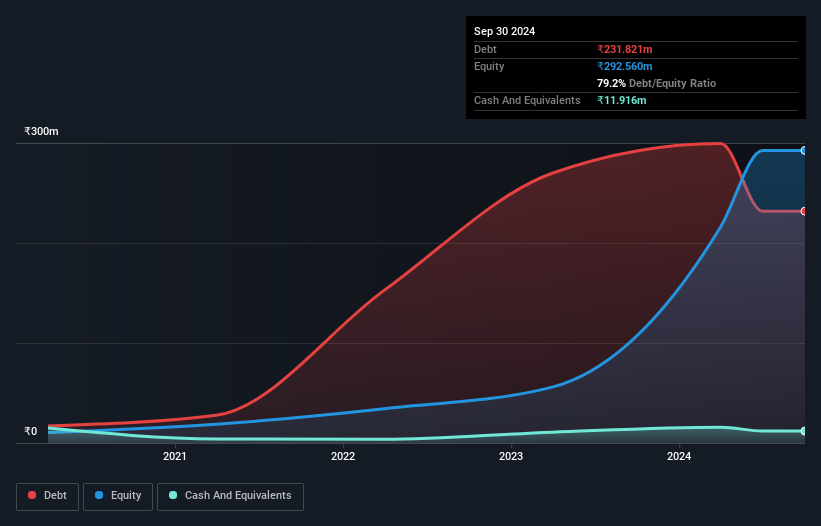- India
- /
- Commercial Services
- /
- NSEI:URBAN
These 4 Measures Indicate That Urban Enviro Waste Management (NSE:URBAN) Is Using Debt Reasonably Well

Some say volatility, rather than debt, is the best way to think about risk as an investor, but Warren Buffett famously said that 'Volatility is far from synonymous with risk.' When we think about how risky a company is, we always like to look at its use of debt, since debt overload can lead to ruin. As with many other companies Urban Enviro Waste Management Limited (NSE:URBAN) makes use of debt. But the more important question is: how much risk is that debt creating?
Why Does Debt Bring Risk?
Debt is a tool to help businesses grow, but if a business is incapable of paying off its lenders, then it exists at their mercy. In the worst case scenario, a company can go bankrupt if it cannot pay its creditors. However, a more common (but still painful) scenario is that it has to raise new equity capital at a low price, thus permanently diluting shareholders. Of course, the upside of debt is that it often represents cheap capital, especially when it replaces dilution in a company with the ability to reinvest at high rates of return. When we examine debt levels, we first consider both cash and debt levels, together.
See our latest analysis for Urban Enviro Waste Management
What Is Urban Enviro Waste Management's Net Debt?
You can click the graphic below for the historical numbers, but it shows that Urban Enviro Waste Management had ₹231.8m of debt in September 2024, down from ₹299.5m, one year before. However, it also had ₹11.9m in cash, and so its net debt is ₹219.9m.

How Strong Is Urban Enviro Waste Management's Balance Sheet?
Zooming in on the latest balance sheet data, we can see that Urban Enviro Waste Management had liabilities of ₹256.9m due within 12 months and liabilities of ₹214.6m due beyond that. Offsetting these obligations, it had cash of ₹11.9m as well as receivables valued at ₹368.5m due within 12 months. So its liabilities outweigh the sum of its cash and (near-term) receivables by ₹91.1m.
Given Urban Enviro Waste Management has a market capitalization of ₹2.06b, it's hard to believe these liabilities pose much threat. Having said that, it's clear that we should continue to monitor its balance sheet, lest it change for the worse.
We use two main ratios to inform us about debt levels relative to earnings. The first is net debt divided by earnings before interest, tax, depreciation, and amortization (EBITDA), while the second is how many times its earnings before interest and tax (EBIT) covers its interest expense (or its interest cover, for short). This way, we consider both the absolute quantum of the debt, as well as the interest rates paid on it.
Urban Enviro Waste Management has net debt of just 0.87 times EBITDA, indicating that it is certainly not a reckless borrower. And this view is supported by the solid interest coverage, with EBIT coming in at 7.7 times the interest expense over the last year. Even more impressive was the fact that Urban Enviro Waste Management grew its EBIT by 116% over twelve months. That boost will make it even easier to pay down debt going forward. There's no doubt that we learn most about debt from the balance sheet. But it is Urban Enviro Waste Management's earnings that will influence how the balance sheet holds up in the future. So if you're keen to discover more about its earnings, it might be worth checking out this graph of its long term earnings trend.
Finally, while the tax-man may adore accounting profits, lenders only accept cold hard cash. So we clearly need to look at whether that EBIT is leading to corresponding free cash flow. Over the last three years, Urban Enviro Waste Management saw substantial negative free cash flow, in total. While investors are no doubt expecting a reversal of that situation in due course, it clearly does mean its use of debt is more risky.
Our View
Happily, Urban Enviro Waste Management's impressive EBIT growth rate implies it has the upper hand on its debt. But the stark truth is that we are concerned by its conversion of EBIT to free cash flow. Looking at all the aforementioned factors together, it strikes us that Urban Enviro Waste Management can handle its debt fairly comfortably. On the plus side, this leverage can boost shareholder returns, but the potential downside is more risk of loss, so it's worth monitoring the balance sheet. There's no doubt that we learn most about debt from the balance sheet. But ultimately, every company can contain risks that exist outside of the balance sheet. For example, we've discovered 2 warning signs for Urban Enviro Waste Management (1 is a bit unpleasant!) that you should be aware of before investing here.
If, after all that, you're more interested in a fast growing company with a rock-solid balance sheet, then check out our list of net cash growth stocks without delay.
New: AI Stock Screener & Alerts
Our new AI Stock Screener scans the market every day to uncover opportunities.
• Dividend Powerhouses (3%+ Yield)
• Undervalued Small Caps with Insider Buying
• High growth Tech and AI Companies
Or build your own from over 50 metrics.
Have feedback on this article? Concerned about the content? Get in touch with us directly. Alternatively, email editorial-team (at) simplywallst.com.
This article by Simply Wall St is general in nature. We provide commentary based on historical data and analyst forecasts only using an unbiased methodology and our articles are not intended to be financial advice. It does not constitute a recommendation to buy or sell any stock, and does not take account of your objectives, or your financial situation. We aim to bring you long-term focused analysis driven by fundamental data. Note that our analysis may not factor in the latest price-sensitive company announcements or qualitative material. Simply Wall St has no position in any stocks mentioned.
About NSEI:URBAN
Urban Enviro Waste Management
Provides waste management solutions and municipal solid waste management services in India.
Outstanding track record slight.
Market Insights
Community Narratives




